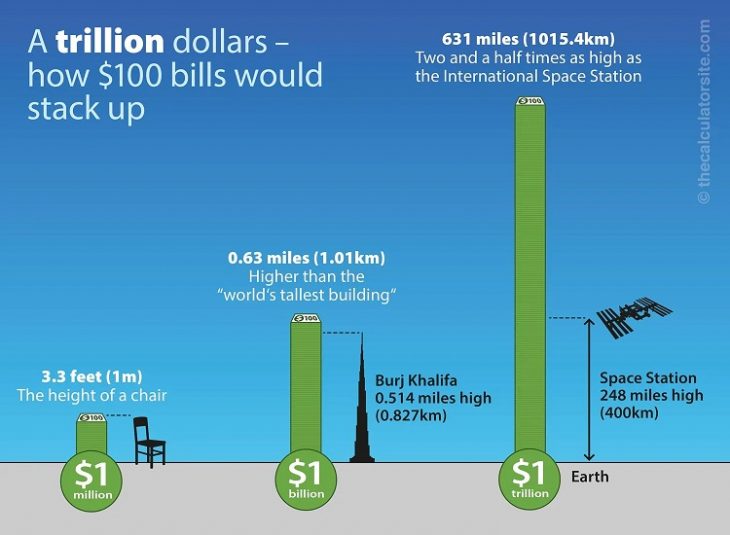
Word of the Day: Supercilious
Today’s word of the day, thanks to dictionary.com, is supercilious, an adjective that means “haughtily disdainful or contemptuous, as a person or a facial expression.” According to www.etymonline.com, the word entered the English language in the “1520s, [meaning] ‘lofty with pride, haughtily contemptuous,’ from Latin superciliosus ‘haughty, arrogant,’” from supercilium ‘haughty demeanor, pride,’ literally ‘eyebrow’ (via notion of raising the eyebrow to express haughtiness), from super ‘above’ (see super-) + second element akin to cilium ‘eyelid,’ related to celare ‘to cover, hide,’ from PIE root *kel- (1) ‘to cover, conceal, save.’” So a supercilious person is one who looks down their nose at others.
On this date in 1981, just 39 years ago, the debt of the United States of America officially reached $1,000,000,000 (one trillion dollars). It’s a bit hard to get a grasp on one trillion dollars, other than “it’s a lot of money.” Here’s a try: each minute has 60 seconds, and each hour has 60 minutes for a total of 3600 seconds. Each day, therefore, has 86,400 seconds, and each year 31,536,000 seconds. One trillion seconds would be over 31,688 years.
Debt is nothing new to the United States. Before the Constitution was even approved by the states, in 1789, the country was in debt from the Revolution. From that point on the federal government has been in debt every year except one, between 1835 and 1836. That initial period saw the government working to reduce the debt except for the time around the War of 1812, when the debt increased. Then on January 8, 1835, Andrew Jackson paid off the debt. But by the next January, the nation was in debt once again, to the tune of $37,000 (about $1,050,000 in today’s dollars), and the debt would never be zero again.
The Civil War drove the debt up significantly. By the end of the war, the debt had reached about $27,000,000,000 (27 billion dollars), which would be a little over 431 billion dollars in today’s market. But over the next five decades, the debt was decreased by over 50%. Then World War I came along, and the government began to borrow money again, a lot of it through the sale of so-called Liberty Bonds. At the end of the war, the US debt reached over $25B. But then in the 1920s, Presidents Harding and Coolidge determined to reduce the national debt, and the debt shrunk by about a third.
The Great Depression not only shrank the national economy, measured by Gross Domestic Product (GDP), but also grew the national debt. By 1936, the debt had surpassed $33B, which was 40% of GDP. Then in the late 1930s the country began preparing for the second world war; and then in 1941 the nation became directly involved in the war, fighting wars in both the Atlantic and Pacific theaters. By 1945, the debt surpassed $250B (110% of GDP), and by 1950 it had reached about $260B.
Congress passed the Congressional Budget and Impoundment Act of 1974 which allowed Congress to challenge the president’s budget, and as a result the spending began to increase dramatically, and the annual budget deficit along with it. And now the debt has surpassed $26,000,000,000,000 (26 trillion dollars).
The population of the USA is about 320,000,000. That means that each and every American owes over $81,000 as their share of the national debt. For some people, that is two or three years of income before taxes. That’s even more than most college graduates will owe in student loans right after they finish school. That’s a lot of money.
Last night, October 23, 2020, the presidential candidates of the Republican and Democratic Parties held their second and final debate. The moderator chose the topics for the evening, and they talked about a lot of different things: climate change, China, the COVID-19 pandemic, Trump’s tax returns, and Biden’s corruption. But one thing they did not talk about was the fact that every American, including newborn babes, owes over $81,000 as their share of the national debt.
Of course, other presidential candidates from other parties, perhaps even candidates who are worried about the national debt, were not included in the debate, the one orchestrated by the Commission on Presidential Debates, an outfit run by the two major parties. Apparently nobody in Washington, DC, wants to really talk about a deficit of $26T.
Perhaps there is no greater example of the supercilious attitude of our political “leaders” than that.
Today’s image is from the Calculator Site (https://www.thecalculatorsite.com/articles/finance/how-much-is-a-trillion.php).